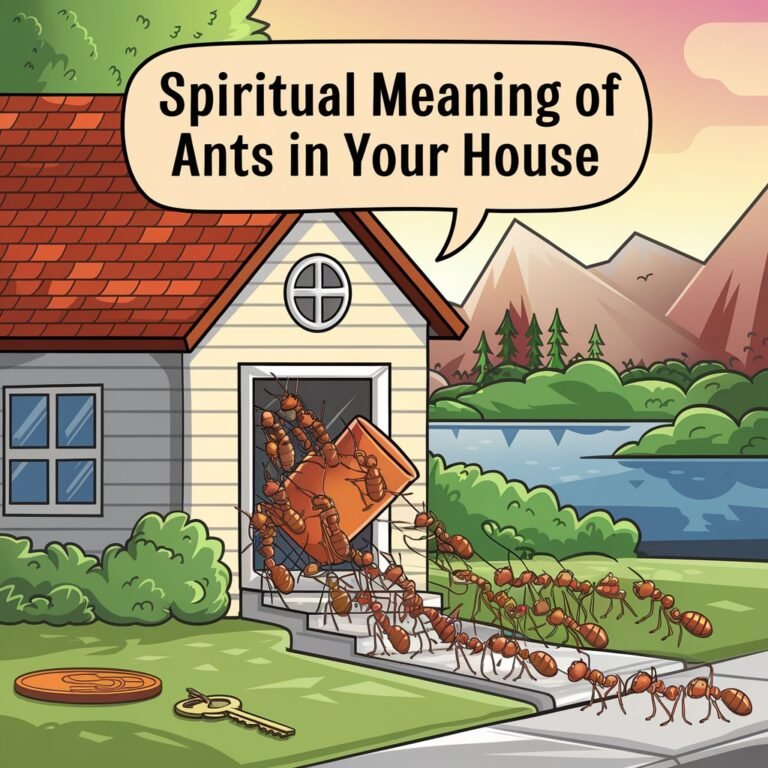13 Spiritual Meanings of Choking on Food
When we think about choking on food, it's easy to dismiss it as a mere physical mishap. However, we might find that this experience carries deeper spiritual meanings that reflect our emotional state and communication patterns. It could signify unexpressed emotions or a blockage in sharing our true selves. As we explore these interpretations, we may uncover insights about our relationships and personal growth. What does it truly mean when we struggle to swallow not just our meals, but our feelings? Let's unpack this together and see where it leads us.
Unexpressed Emotions
When we think about choking on food, it often serves as a powerful metaphor for unexpressed emotions. Just as food can get stuck in our throats, so can our feelings.
We might find ourselves holding back tears or words that need to be shared, leaving us feeling suffocated by unaddressed feelings. It's important to recognize that we're not alone in this experience; many of us struggle with the weight of what we don't say.
Emotional release is essential for our well-being. When we allow ourselves to express what we've been holding inside, we create space for healing and connection.
Imagine how liberating it feels to finally articulate those long-buried emotions. We can breathe more freely once we let go of the things that weigh us down.
Blocked Communication
Blocked communication often manifests as a choking sensation, echoing the struggle we face when words refuse to flow. We may find ourselves caught in the throes of communication barriers, feeling stifled as our thoughts and feelings remain unvoiced. This sensation can remind us of the importance of finding our expressive outlets, enabling us to articulate what lies within us.
When we experience this choking feeling, it often signals deeper issues at play. Perhaps we're grappling with unresolved feelings or fears that prevent us from speaking our truth. It's essential to recognize that we're not alone in this journey; many of us share similar experiences.
Together, we can explore ways to break down these barriers, nurturing our ability to communicate openly and honestly.
Let's embrace the idea that expressing ourselves isn't just a personal need but a collective one. By creating safe spaces for dialogue, we can encourage one another to share our voices. In this way, we can transform that choking sensation into a liberating gust of fresh air, paving the way for connection and understanding.
Fear of Judgment
In our journey toward open communication, we often encounter the fear of judgment, which can be just as stifling as the choking sensation itself. This fear frequently stems from our self-image concerns and the weight of societal expectations.
It's crucial to recognize that we're not alone in feeling this way; many of us face similar struggles.
To navigate through this fear, we can consider:
- Embracing Vulnerability: Sharing our thoughts and feelings openly can foster deeper connections, reminding us we're all human.
- Challenging Societal Norms: By acknowledging that societal expectations often create unrealistic standards, we can liberate ourselves from their grip.
- Cultivating Self-Compassion: Practicing kindness toward ourselves helps us accept our imperfections, allowing us to express our true selves without fear.
As we confront this fear together, let's remind ourselves that our worth isn't defined by others' opinions.
Instead, it's found in our authenticity, our shared experiences, and our ability to connect.
Resistance to Change
Change can feel intimidating, and many of us grapple with resistance as we navigate life's shifts. We all crave stability and familiarity, which can make the idea of personal growth seem overwhelming. Often, we cling to the old ways of being, fearing that transformation will lead us into the unknown.
It's important to recognize that this resistance is a natural part of our transformation journey.
When we choke on our food, it can symbolize how we struggle to digest new experiences and ideas. This resistance can manifest in various ways, from procrastination to outright denial.
Yet, embracing change doesn't mean we've to rush headlong into the unknown. Instead, we can take small, mindful steps toward transformation, allowing ourselves to feel safe and supported in our journey.
Let's remind each other that it's okay to feel hesitant. We're not alone in this experience; many of us share the same fears and doubts.
Need for Nourishment
Nourishing our bodies and souls is essential for our overall well-being, yet many of us often overlook this fundamental need. We sometimes get so caught up in the hustle of daily life that we forget to prioritize what truly sustains us.
It's vital to recognize that nourishment goes beyond food; it encompasses our emotional and spiritual needs as well.
Here are some aspects we should focus on for a well-rounded sense of nourishment:
- Nourishing Connections: Building relationships that uplift and support us can feed our spirits, reminding us we're never alone in our journey.
- Mindful Eating: Taking the time to enjoy our meals can transform eating into a sacred ritual, bringing awareness to the essential sustenance we consume.
- Self-Care Rituals: Integrating daily practices like meditation or journaling allows us to nurture our inner selves, fostering a deeper connection with who we are.
Life Lessons
Choking on food can serve as a powerful metaphor for the lessons life throws our way. We've all faced those moments when we feel overwhelmed, unable to digest our experiences. These instances remind us that life isn't always smooth sailing; sometimes, we need to pause, reflect, and allow ourselves the space for personal growth.
When we choke on our emotions, it's a signal that we may be holding onto something that no longer serves us. Instead of pushing through, we can take this opportunity for emotional healing. We can gently explore what's causing the blockage and seek support from those who understand our journey.
Together, we can learn to navigate the complexities of our lives, allowing ourselves to feel vulnerable and connected. It's in these shared experiences that we find our belonging. By recognizing the lessons hidden within our struggles, we can transform them into stepping stones toward a more fulfilling life.
Let's embrace the idea that choking isn't just a struggle; it's a chance to grow. When we face our challenges head-on, we become stronger, more resilient versions of ourselves, ready to savor life's offerings fully.
Warning Sign From the Body
Our bodies often send us subtle—and sometimes not-so-subtle—messages about what we need to address in our lives. When we experience choking on food, it can serve as a powerful reminder to listen to those body signals.
These moments can reveal underlying emotional or spiritual conflicts we might be ignoring. Together, we can explore some key intuitive insights to help us reflect:
- Unexpressed Emotions: We might be holding back feelings that need to be voiced. Choking can symbolize the difficulty in expressing ourselves fully.
- Overwhelm: If life feels too chaotic, choking could indicate that we're trying to take on too much at once. It's our body's way of urging us to slow down and reassess.
- Nutritional Needs: Sometimes, it may point to a disconnect in what we consume—physically and emotionally. Are we nourishing ourselves adequately?
Spiritual Awakening
During moments of distress, like choking on food, we might find ourselves on the brink of a spiritual awakening. These intense experiences often serve as catalysts for deeper understanding and connection to our inner selves.
When we face such frightening situations, we're pushed to confront our vulnerabilities and reflect on our lives, prompting spiritual growth. As we navigate these challenges, we can discover new perspectives and insights that lead to personal transformation.
It's in these moments of fear and uncertainty that we might realize the importance of mindfulness and presence. We're reminded to cherish our bodies, nourish ourselves, and appreciate each moment.
This awakening isn't just about overcoming fear; it's about embracing the lessons that arise from these experiences. By sharing our stories and feelings, we foster a sense of belonging, creating a supportive community where we can grow together.
Let's allow these moments to guide us toward a more profound understanding of ourselves and our spiritual paths. Together, we can transform our distress into opportunities for growth, deepening our connections with each other and the world around us.
Stress and Anxiety
When we find ourselves caught up in the grips of stress and anxiety, it can feel overwhelming and isolating.
It's important to remember that we're not alone in this journey. Many of us experience these feelings, and acknowledging them is a crucial step toward healing.
Here are three ways we can cultivate better stress management and find anxiety relief together:
- Mindful Breathing: Taking a moment to focus on our breath can ground us. Inhale deeply, hold for a few seconds, and slowly exhale. This simple practice can help us regain clarity and calm.
- Connect with Others: Sharing our feelings with trusted friends or family can lighten our emotional load. We find strength in community, reminding ourselves that vulnerability leads to deeper connections.
- Create a Routine: Establishing a daily structure can provide us with a sense of control. Whether it's a morning walk or a designated relaxation time, routines can anchor us amidst chaos.
Repressed Creativity
How often do we find ourselves stifling our creative impulses, feeling as if our true selves are trapped beneath layers of expectation? Many of us experience moments of creative blockage, where our ideas and passions seem to vanish, leaving us feeling unfulfilled.
This artistic suppression often stems from external pressures—societal norms, family expectations, or even our own self-doubt.
When we choke on our creativity, it's like trying to swallow something that just won't go down. We might feel an overwhelming urge to express ourselves, yet we hold back, fearing judgment or rejection.
It's crucial to recognize this cycle and understand that we're not alone. Together, we can create a safe space where our creativity can flow freely.
Overwhelm and Burnout
Many of us have felt the crushing weight of overwhelm and burnout creeping into our lives, leaving us exhausted and disheartened.
This emotional overload can manifest in various ways, often leading to energy depletion that feels insurmountable. We might find ourselves struggling to keep up with daily demands, feeling as if we're drowning in responsibilities.
To navigate this challenging terrain, we can focus on three vital steps:
- Recognize Your Limits: Understanding and acknowledging our personal boundaries is vital. We can't pour from an empty cup.
- Prioritize Self-Care: Engaging in activities that replenish our spirit—like meditation, walks in nature, or simply resting—can make a world of difference.
- Seek Support: We're not alone in this journey. Reaching out to friends, family, or professionals can provide the comfort and guidance we need.
Reflection of Relationships
Often, we find ourselves reflecting on our relationships during moments of stress or discomfort, and this introspection can reveal deeper truths about our connections with others.
When we choke on food, it can symbolize our struggles with communication and emotional intimacy within our relationships. We might notice how certain dynamics play out, revealing patterns that no longer serve us.
As we navigate these feelings, let's consider how our interactions can shift. Are we truly listening to one another? Are we expressing our needs openly?
By examining these relationship dynamics, we can identify where we might be holding back or feeling stifled. It's essential to create spaces where vulnerability is welcomed, allowing us to connect on a deeper level.
In this journey, we should remind ourselves that it's okay to seek support. We're not alone in this experience; we all crave belonging and understanding.
Call for Mindfulness
Choking on food can serve as a powerful reminder to cultivate mindfulness in our daily lives. It nudges us to embrace the present moment, encouraging us to slow down and truly savor our experiences.
Together, we can explore how mindful eating can transform our relationship with food and ourselves.
Here are three ways to foster mindfulness during meals:
- Savor Each Bite: Let's take time to appreciate the flavors, textures, and aromas of our food. This practice not only enhances our enjoyment but also promotes a deeper connection to our nourishment.
- Minimize Distractions: By turning off screens and setting aside our phones, we can create a serene space for eating. This allows us to focus on the act of eating and be fully present with our meal.
- Practice Gratitude: Before we eat, let's take a moment to express gratitude for the food and the hands that prepared it. This simple act can deepen our appreciation and reinforce our connection to the food we consume.
Frequently Asked Questions
Can Choking on Food Signify a Specific Spiritual Message?
We believe that choking on food can represent a struggle with spiritual symbolism, reflecting our relationship with food energy. It's essential to explore these moments, as they may guide us towards deeper understanding and connection.
How Can I Prevent Choking From a Spiritual Perspective?
To prevent choking, we can embrace preventative practices like mindful eating and spiritual awareness. Let's nurture our connection to food, savor each bite, and create a safe space where we all feel supported and understood.
Is There a Connection Between Diet and Spiritual Well-Being?
We believe there's a profound connection between diet and spiritual well-being. By practicing mindful eating, we nourish our bodies and souls, fostering a deeper sense of belonging and connection to ourselves and others in our community.
What Role Does Mindfulness Play in Eating Habits?
Mindfulness plays an essential role in our eating habits. By embracing mindful eating and conscious consumption, we nurture our connection with food, fostering awareness and appreciation that ultimately brings us closer together in our shared experiences.
Are There Specific Meditations for Overcoming Choking Fears?
We can explore meditation techniques that help us overcome anxiety about choking. By practicing mindfulness and visualization, we nurture our confidence, creating a safe space for our minds and bodies to feel relaxed during meals together.

Sofia Phillips is a renowned spirituality expert and the visionary behind SoulfulCreature.com. With a compassionate heart and an enlightened mind, Sofia embarks on a quest to guide others through the realms of spirituality. Her approach is deeply rooted in providing a nurturing and positive experience, allowing individuals to explore and grow in their spiritual journey.






